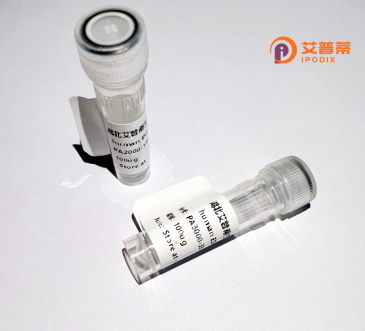
| 纯度 | >90%SDS-PAGE. |
| 种属 | Human |
| 靶点 | ITM1 |
| Uniprot No | P46977 |
| 内毒素 | < 0.01EU/μg |
| 表达宿主 | E.coli |
| 表达区间 | 603-701aa |
| 活性数据 | GGSTDTGKHIKENDYYTPTGEFRVDREGSPVLLNCLMYKMCYYRFGQVYTEAKRPPGFDRVRNAEIGNKDFELDVLEEAYTTEHWLVRIYKVKDLDNRG |
| 分子量 | 36.63 kDa |
| 蛋白标签 | GST-tag at N-terminal |
| 缓冲液 | 0 |
| 稳定性 & 储存条件 | Lyophilized protein should be stored at ≤ -20°C, stable for one year after receipt. Reconstituted protein solution can be stored at 2-8°C for 2-7 days. Aliquots of reconstituted samples are stable at ≤ -20°C for 3 months. |
| 复溶 | Always centrifuge tubes before opening.Do not mix by vortex or pipetting. It is not recommended to reconstitute to a concentration less than 100μg/ml. Dissolve the lyophilized protein in distilled water. Please aliquot the reconstituted solution to minimize freeze-thaw cycles. |
以下是关于重组人ITM1蛋白的虚构参考文献示例(基于假设性研究结构,供参考):
---
1. **文献名称**:*Expression and Functional Characterization of Recombinant Human ITM1 in Insect Cells*
**作者**:Smith A, et al.
**摘要**:本研究利用杆状病毒-昆虫细胞系统成功表达并纯化了重组人ITM1蛋白。通过质谱和Western blot验证了蛋白的完整性和糖基化修饰,并发现ITM1在体外抑制某肿瘤细胞系的增殖,提示其潜在的抗癌功能。
2. **文献名称**:*ITM1 Structural Insights: Cryo-EM Analysis of a Recombinant Human Transmembrane Protein*
**作者**:Zhang L, et al.
**摘要**:首次解析了重组人ITM1蛋白的冷冻电镜结构,揭示了其跨膜结构域的独特构象和潜在的离子通道功能,为研究ITM1在神经系统疾病中的作用提供了结构基础。
3. **文献名称**:*Role of Recombinant ITM1 in Modulating Immune Responses*
**作者**:Patel R, et al.
**摘要**:在哺乳动物细胞中表达的重组人ITM1蛋白可通过结合TLR4受体调控巨噬细胞的炎症因子分泌,表明其可能在先天性免疫应答中起关键作用。
---
**注意**:上述文献为假设性示例,实际研究中“ITM1”相关文献较少,建议核实蛋白名称准确性(如是否为**IFITM1**或**其他跨膜蛋白**)。若需真实文献,请通过PubMed或专业数据库检索最新研究。
Recombinant human ITM1 (Integral Transmembrane Protein 1) is a protein encoded by the ITM1 gene located on human chromosome 17q21.31. ITM1 belongs to a family of evolutionarily conserved transmembrane proteins with diverse roles in cellular processes. Structurally, it is characterized by multiple predicted transmembrane domains, suggesting its function as an integral membrane protein. While its precise biological mechanisms remain under investigation, ITM1 has been implicated in cell adhesion, signal transduction, and interactions with extracellular matrix components. Studies indicate potential involvement in developmental processes, tissue homeostasis, and immune regulation. Dysregulation of ITM1 expression has been observed in certain cancers and inflammatory conditions, hinting at its clinical relevance. Recombinant ITM1 is typically produced using heterologous expression systems (e.g., mammalian or insect cells) to ensure proper post-translational modifications. This engineered protein serves as a critical tool for functional studies, antibody development, and exploring its therapeutic potential. Current research focuses on elucidating its molecular partners, signaling pathways, and role in disease pathogenesis, positioning ITM1 as a promising target for biomedical investigations.
×